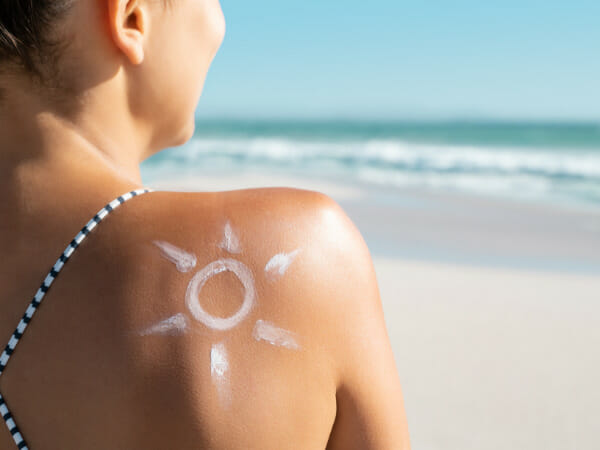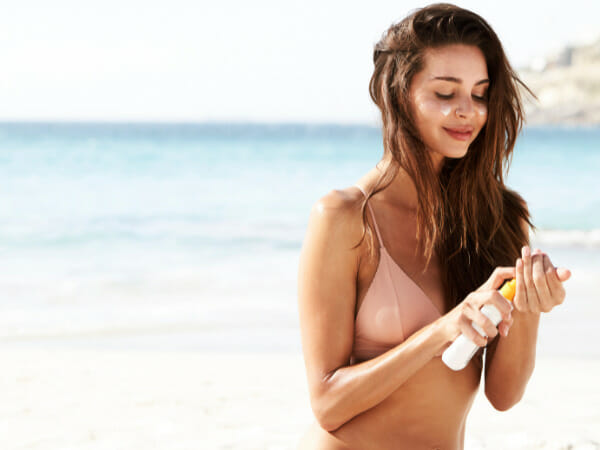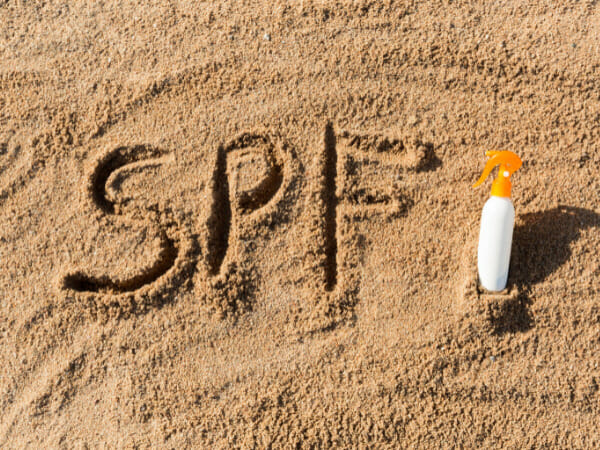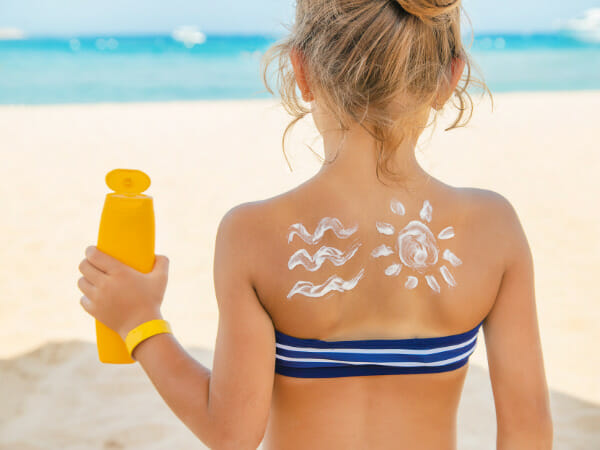Top 10 Sunscreen For Sensitive Skin: How To Protect Yourself This Summer
Summer is fast approaching, and long days in the sun, sand, and saltwater are harsh on sensitive skin. So, you should pick the best sunscreen for sensitive skin. While you can’t protect your skin from everything, you can avoid harmful UVB rays with the best SPF for sensitive skin.
Ask a dermatologist for their best skincare advice. They’ll first say to use the best SPF for sensitive skin every day. Whether sunny or cloudy outdoors, you can cut your risk of getting cancer on the skin. Besides, you may prevent premature wrinkles by shielding your skin from harmful UV rays—what a win-win situation.
While applying sunscreen is beneficial for maintaining a healthy dermis, finding the perfect one can be difficult. We have placed everything you need to know about sunscreen to help you decide on the best SPF for sensitive skin. Besides, we have a list of the best sunscreens that will suit sensitive skin types.
The Benefits of Sunscreen for Sensitive Skin
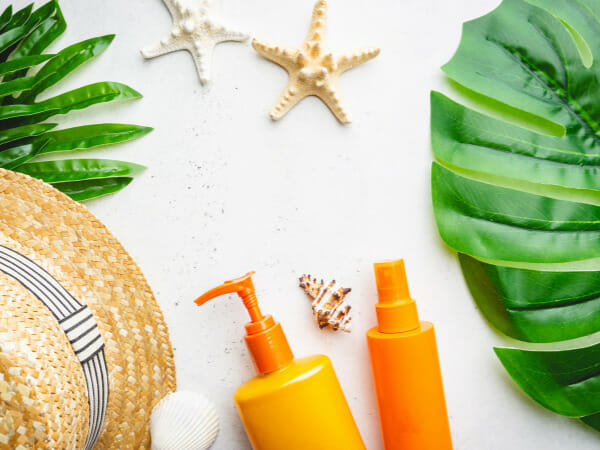
Your skin is your largest organ. It serves essential duties such as protecting you from viruses and regulating your body’s temperature. If you don’t use the best SPF for sensitive skin, your skin is exposed to various issues.
While your skin protects your body from the sun’s rays, that doesn’t mean you should go out without protecting your skin. Here are reasons to use the best SPF for sensitive skin every day.
Protect your sensitive skin from sunburn
A painful burn can happen from too much sun exposure or UV rays. Increased sunspots and free radical damage may result from repeated exposure without protection. Sunburn can also raise your chances of getting cancer on the skin. Sunburns might take longer to cure, so it’s essential to wear physical sunscreens every day, even on gloomy days.
Take care of your Acne-Prone skin
Acne can be worse by not wearing sunscreen. Although you may enjoy the way, your skin looks after a day in the sun, getting a sunburn will only aggravate your acne. It’s critical to use the best SPF for sensitive skin.
If you’re prone to acne, look for physical sunscreens with less abrasive chemical filters. These soothing ingredients are avobenzone, Oxybenzone, methoxycinnamate, octocrylene, and zinc oxide. Even if you have acne skin, you should use the best SPF for sensitive skin.
Look for the term “non-comedogenic” on your sunscreen label. Also, ask your board-certified dermatologist to recommend the best SPF for sensitive skin. Non-comedogenic products do not clog pores, helping to reduce acne breakouts.
Remember, you must wipe off sunscreen after spending time in the sun. Any dirt, oils, or germs gathered on your skin will easily access your pores. This case will cause inflammation, clogged pores, bacteria, and other situations that lead to acne flare-ups.
Mineral sunscreens are environmentally friendly while protecting your skin
Skin protection requires the use of sunscreen. The most environmentally friendly option is mineral sunscreen. In addition, Mineral-based sunscreen is usually the better but also healthier choice.
Traditional zinc oxide sunscreens and nanoparticle sunscreens are both safe and effective. Both will be declared safe for reefs. Instead of using chemical filters that harm the ocean’s coral reefs, they use natural soothing ingredients.
Unlike chemical sunscreens, the mixture sits on top of the skin rather than fully absorbing and entering the bloodstream. In the end, any sort of sunscreen will protect your skin. It’s simply an issue of picking one that protects you and the environment.
Prevent Broken Blood Vessels
UV rays, also known as telangiectasias, can shrink the skin’s blood vessel walls by damaging them. The weakening of blood vessels causes the appearance of bruises or bleeding.
Reducing Aging Symptoms
Make sunscreen your friend if you want to reduce the signs of premature aging. Going outdoors without sunscreen can harm your skin’s collagen and connective fibers. In addition, it will cause it to lose suppleness and wrinkle.
Sunscreen is typically applied to special outdoor situations like going to the beach or attending a picnic. While sunscreen helps to prevent sunburns and skin cancer, it also helps decrease the appearance of skin aging. Daily sunscreen has been shown to help slow down the skin’s aging process.
People who use broad-spectrum lotion daily had 24 percent less skin aging than those who occasionally use sunscreen. The study, placed in the Annals of Internal Medicine, followed over 900 participants for four years. According to the study, even people in their 40s and 50s who started using sunscreen daily exhibited less evidence of skin aging.
Avoid the Appearance of Sunspots
Sunspots, often known as “age spots” or “liver spots,” are caused by exposure to the sun’s UV radiation and contribute to the appearance of aging. Moreover, these are flat regions of discolored skin that can be various hues of brown and are caused by hyperpigmentation of the skin. In addition, you can find it in the following body parts: Face, Shoulders, Arms, Back, and the palms of the hands.
Reduce the Cancer Risk
Wearing sunscreen is the most effective strategy to lower cancer risk on the skin. The Centers for Disease Control and Prevention (CDC) recommends applying a broad-spectrum lotion with an SPF of at least 15. Sunscreen with higher numbers provides superior protection from UV.
Apply sunscreen throughout the day for all-day protection. When you spend more than 2 hours in the sun, reapply after a swim or a workout and after drying off.
Things to consider when choosing a sunscreen for sensitive skin
Mineral and chemical sunscreens are the two most common types of sunscreen. While they can both protect your skin from existing sun damage, you should weigh the benefits and downsides of each before making your decision.
1. Chemical sunscreens
Chemical sunscreen contains chemical filters that shield the skin from the sun’s harmful UV rays. Oxybenzone and avobenzone are the most used chemical SPF components. These chemicals absorb UV light before reaching your skin, acting like a sponge.
Chemical sunscreens are what most people think of as sunscreen—a study entitled “Assessing The Current Market of Sunscreen” by Kyle Amber. Chemical SPF components are used in more than 96 percent of the best sunscreens marketed in the United States.
Advantages of Chemical Sunscreen
This kind of sunscreen absorbs rather than rests on top of the skin. This sunscreen is usually lighter than mineral SPF and won’t stain your skin. They’re typically used as a makeup primer, and they’re also an excellent choice for those prone to acne.
Also, it penetrates fast and dry with an almost undetectable finish, making them perfect for daily use. Chemical sunscreen filters are ideal for persons with a darker skin tone because of their lightweight formula and non-chalky feel.
2. Mineral sunscreens
Mineral sunscreen forms a visible barrier between your skin and the sun. Also, they contain natural substances such as zinc oxide. This ingredient provides excellent protection but can create a white cast, especially with a darker skin tone. Choose a mineral sunscreen with a subtle tint to match your skin tone. These best sunscreens are also healthier for delicate skin in general.
Advantages of Mineral sunscreen
Chemical sunscreens are accessible and have advantages, but they are not suitable for sensitive skin. Some of its natural ingredients can irritate the skin, particularly individuals with sensitive skin types or prone to acne skin. On the other hand, Mineral sunscreen makes an excellent choice for people with ultra-sensitive skin.
The mineral sunscreen is the choice for baby sunscreen. Furthermore, mineral sunscreen active components are more environmentally friendly, especially for aquatic habitats. In addition, it is preferable for people seeking a more ecologically friendly cosmetic routine.
3. Fragrance
You should avoid fragrance-containing sunscreens because they can irritate the skin.
4. Sun Protection Factor (SPF)
A sunscreen’s SPF indicates how many UVB rays it can block. Dermatologists advise applying at least SPF 30. SPF 30 protects skin from roughly 97 percent of UVB rays.
Every day, make sure you apply adequate sunscreen to any exposed skin. Apply an SPF 30 base coat to the entire body half an hour before leaving the house and reapply every two hours. If you’re going swimming, it’s good to apply sunscreen every time you exit the water.
Remember that no sunscreen will entirely protect you from the sun, so frequently reapply throughout the day. Moreover, you can wear protective clothing such as hats, sun-protective swimwear, and clothing. In addition, seek shade whenever possible.
How to get the best sunscreen for sensitive skin
Choose broad-spectrum coverage
For beginners, the American Dermatology Association (ADA) recommends a “broad-spectrum” sunscreen, which protects against both UVA and UVB radiation. UVA rays age your skin prematurely, generating wrinkles and age spots, but UVB rays cause sunburn. Cancer of the skin can result from excessive exposure to both.
Consider the SPF
A number on the bottle indicates the SPF level of sunscreen. Typically, there are SPL levels 15, 30, 50, and so on. The number refers to how long it will protect your skin from burning if you use sunscreen. If you use SPF 30, it will protect your skin for 30 times longer than if you don’t use sunscreen.
Though you’re technically covered for a specific amount of time, it’s generally recommended that you reapply your broad-spectrum sunscreen every two hours for the best results.
Even when the sun isn’t shining, most doctors advise wearing at least SPF 30 sunscreen. SPF 15 blocks roughly 98 percent of UVB rays, and SPF 30 protects nearly 97 percent.
Check your skin type on whether you have acne-prone or sensitive skin
If you have acne or oily skin, search for a sunscreen that says “non-comedogenic,” which indicates it hasn’t been proven to clog pores. Look for the best sunscreens containing moisturizing components if you have dehydrated skin. Choose a physical or mineral sunscreen for sensitive skin.
Physical sunscreen contains zinc oxide and titanium dioxide to protect the skin, which does not burn or sting the eyes. They sit on top of your skin, producing a protective barrier. On the other hand, chemical sunscreen contains avobenzone and Oxybenzone.
These substances absorb UV rays and prevent them from getting to your skin. Also, they are easier to apply. However, it can irritate your skin if you’re prone to sensitivity.
Which is the best type of sunscreen?
It’s entirely up to you whether your sunscreen comes in a lotion, spray, or other forms. Sunscreens are available in creams, lotions, gels, sprays, sticks, and formulations. The most effective SPF is the one that you use.
Of course, sunscreen is only effective if it is applied correctly. You should use an ounce of SPF on all of your exposed skin. Every two hours after intense sweating or swimming, you can reapply using roughly a nickel-sized dab for your entire face.
If you just have a spray sunscreen and need to reapply it, spray it straight on your hands. Then, spread it evenly throughout your face with your fingertips.
Difference between sunscreen for body vs. face
The primary reason for using different sunscreens for your face and body is that your facial skin has higher sensitivity than the rest of your body. Because facial sunscreens are usually free from excess oil, they’re gentler on the face and won’t cause breakouts.
If you have sensitive and prone to acne skin, using different sunscreens for your face and body is very crucial. Mineral sunscreen is preferable over a chemical sunscreen, which can be harsher if you have sensitive skin.
You also use more sunscreen on your body than your face because you’re protecting more skin. Body sunscreen is more inclined to leave a white residue on your face, which you don’t want. Sunscreens formulated specifically for the face are easier to apply and combine with other products.
10 Best Sunscreens for Sensitive Skin
If you have sensitive skin, finding the right sunscreen can be a challenge. With so many different brands and formulations on the market, it can be hard to know which one is best for you. To help make your search a little easier, we’ve compiled a list of 10 sunscreens that are gentle enough for sensitive skin. So whether you’re looking for something that’s fragrance-free or noncomedogenic, we’ve got you covered.
Best Sunscreens for Your Body
Best Seller for Body Sunscreen
Sun Bum Original SPF 50 Lotion
- Size: 8 Oz
- SPF Level: 50
- Scent: Original Scent
- Skin Type: Best for all skin types, including sensitive skin
The non-comedogenic sunscreen is free from oil, water-resistant, and reef-friendly. In addition, this SPF 50 Lotion is perfect for all skin types. Also, it provides UVA and UVB protection while being filled with Vitamin E. Moreover, moisturizing your skin is essential for sun safety. To ensure an enjoyable day in the sun, you should have sunscreen. This original sunscreen line is hypoallergenic and free of Oxybenzone, Octinoxate, Gluten, Cruelty, and Paraben.
In addition, you should apply this SPF 15 minutes before going out. Furthermore, use it abundantly on all skin regions, avoiding the eye area. Reapply after eighty minutes of sweating or swimming for optimal effects. To get the best sun protection, reapply every two hours.
Best water-resistant sunscreen for sensitive skin
Neutrogena Beach Defense Lotion
- Size: 6.7 Oz
- SPF Level: 70
- Scent: Fragrance-Free Formula
- Skin Type: Sunscreens for Sensitive Skin
This sunscreen provides excellent protection against harsh summer conditions. For busy families, the broad-spectrum SPF 70 lotion is ideal. Furthermore, this beach-strength sunscreen lotion has been proven to protect against the sun. This sunscreen is also water-resistant.
Also, it’s a light and quick-absorbing lotion. Helioplex is a sunscreen technology that provides better broad-spectrum protection against skin-aging UVA and skin-burning UVB radiation. Nothing beats a time at the beach, but the sun may be harmful to your skin without adequate protection.
Excessive water exposure might also impair your skin’s natural protective barrier. So, the next time you hit the beach, protect your skin with this broad-spectrum lotion that has been clinically proven to help protect against the indications of sun and water damage.
Wear sunscreen 15 minutes before leaving the house and repeat every two hours after sweating, swimming, or towel drying. Put enough sunscreen to protect all exposed skin that will not be concealed by clothing. To fully cover the entire body, most adults require approximately 1 ounce. Remember to apply to the soles of your feet, neck, ears, and the top of your head.
Best Budget-friendly sunscreen for sensitive skin
Eucerin Daily Hydration Broad Spectrum Coverage
- Size: 8 Oz
- SPF Level: 30
- Scent: Slight scent
- Skin Type: Sensitive Skin and Dry Skin
This cream moisturizes the dehydrated skin with Broad Spectrum protection for 24 hours. Moreover, it also protects your skin from sunburn and long-term skin damage. In addition, it contains Pro-Vitamin B5 and Sunflower Oil.
This Eucerin body cream is fragrance-free and dye-free. Also, this 2-in-1 moisturizer and Broad Spectrum SPF are safe for sensitive skin. When used as advised, this body moisturizer is ideal for people with dry skin.
Apply this Eucerin sunscreen cream generously 15 minutes before going out in the sun. When swimming or sweating, use this water-resistant sunscreen. At least every 2 hours, reapply. Eucerin is a dermatologist-recommended skincare line that follows a strictly scientific approach.
Best sunscreen for sensitive skin
Aveeno Protect
- Size: 3 Oz
- SPF Level: 60
- Scent: Natural Fragrance
- Skin Type: Sunscreens for Sensitive Skin
Aveeno Protect + Hydrate body moisturizes and protects your skin from the sun. This weightless sunscreen from Aveeno, a dermatologist-recommended brand for over 65 years, provides SPF 60 to protect against dangerous UVA and UVB radiation and prevent sun-induced free radical damage that accelerates skin aging. The daily sunscreen, which contains nourishing prebiotic oat, profoundly hydrates skin all day, leaving it soft and moisturized.
The moisturizing sunscreen also helps prevent sunburn and reduces the risk of cancer when used as prescribed in conjunction with other skin protection measures. It won’t discolor skin because the non-greasy, hypoallergenic formula dries clear. The hydrating SPF 60 sunscreen is water and sweat resistant for 80 minutes.
For outdoor activities, the hydrating SPF 60 lotion is ideal. Apply sunscreen 15 minutes before sun exposure. You may also reapply every two hours or as needed for optimal results.
Best moisturizing sunscreen for sensitive skin
Hawaiian Tropic Sheer Touch Lotion Sunscreen
- Size: 8 Oz
- SPF Level: 30
- Scent: Tropic Fragrance
- Skin Type: Best for all kinds
Hawaiian Tropic Sheer Touch Ultra Radiance Sunscreen lotion offers triple protection, softening, and radiance for gorgeous skin. This opulent composition has a slight sheen and leaves your skin soft and radiant. Hawaiian Tropic Sheer Touch sunscreen creams protect against UVA and UVB rays while remaining free from essential oils and non-greasy.
For skin-loving suncare you can trust, this ultra-conditioning solution contains Vitamin E, Vitamin C, mango fruit extract, and a shea butter complex. Hawaiian Tropic not only protects your body with broad-spectrum UVA and UVB protection, but it also serves to safeguard the environment by developing Reef Friendly, Cruelty-Free sunscreens.
It features an Ultra Radiance formula that makes your skin glow. It’s also oil-free, so it doesn’t appear or feel greasy. It also contains Vitamins C and E, which help condition the skin. Hawaii’s island botanicals are celebrated in this tropical-scented sunscreen. It’s Reef Friendly since it’s free of Oxybenzone and Octinoxate. It was also never tested on animals, earning the PETA Cruelty-Free certification. It has broad-spectrum UV rays protection.
Best Sunscreens for Your Face
Best Seller in Mineral sunscreens
EltaMD UV Clear Facial Sunscreen
- Size: 1.7 Oz
- SPF Level: 46
- Scent: Unscented
- Skin Type: Sunscreens for Reactive Skin
This mineral sunscreen has a whole array of broad-spectrum SPF. You can protect your head to toe because it contains Zinc Oxide. The substance, Zinc Oxide, protects against the broadest range of UVA and UVB radiation. This lightweight sunscreen is fragrance-free. Also, the Non-Comedogenic mineral sunscreen is sensitivity-free and paraben-free. Everybody needs mineral sunscreen every day.
EltaMD UV Clear protects sensitive skin types prone to discoloration and outbreaks of acne and rosacea. Furthermore, it includes niacinamide (vitamin B3), hyaluronic acid, and lactic acid. These chemical sunscreen ingredients help to promote healthy-looking skin.
Furthermore, this moisturizer is very light and silky. Also, this SPF may be worn alone or with makeup. For everyday use, choose from tinted sunscreen to untinted formulations.
Best Water-resistant sunscreen
Neutrogena Sport Face Oil-Free Lotion
- Size: 2.5 Oz
- SPF Level: 70
- Scent: Light Scent
- Skin Type: Sunscreens for Acne Prone and Sensitive Skin
Neutrogena Sport Facial Sunscreen with Broad Spectrum SPF 70+ protects skin against aging. This facial sunscreen is sweat-resistant and water-resistant, ideal for outdoor sports activities. This SPF is formulated specifically with Helioplex, a UV protection technology that helps nourish the skin.
When worn as prescribed, the active sunscreen can help prevent cancer. Also, it can avoid early skin premature aging caused by the sun because this sport sunscreen is oil-free and PABA-free. Furthermore, it comes from the #1 board-certified dermatologist-recommended suncare brand.
Top Sunscreens for Budget-conscious People
CeraVe Tinted Sunscreen with SPF 30
- Size: 1.7 Oz
- SPF Level: 30
- Scent: Unscented
- Skin Type: All skin kinds, including sensitive skin
CeraVe Hydrating Sunscreen Sheer Tint lotion is created in collaboration with dermatologists. It delivers broad-spectrum protection with 100 percent mineral filters. Also, it gives skin a natural glow without leaving a white cast. Furthermore, it is suitable for eczema-prone skin.
With three essential ceramides that help restore the skin’s natural barrier, this non-greasy product provides all-day hydration. It’s also fragrance-free, paraben-free, oil-free, non-comedogenic, and allergy-tested. It’s kind to the skin. Furthermore, the skin cancer foundation also recommends this sunscreen.
Best sunscreens for sensitive skin on the face
Cerave Facial Moisturizing Lotion with Sunscreen
- Size: 3 Oz
- SPF Level: 30
- Scent: Light scent
- Skin Type: Sensitive skin
This CeraVe SPF moisturizer is a facial lotion that absorbs quickly and doesn’t leave a greasy residue. Apply this daily face sunscreen as the final step in your morning skincare routine. You can apply this moisturizer after all other face products have been thoroughly absorbed.
It contains Hyaluronic Acid, which helps keep skin moisturized, and Niacinamide, which helps relax the skin. MVE Technology keeps you hydrated all day long. Furthermore, Ceramides are naturally occurring lipids that make up half of the lipids in the skin barrier.
The Skin Cancer Foundation recommends it for everyday usage. It is non-comedogenic, fragrance-free, and free from essential oils. Suitable for dry, sensitive, acne-prone, and oily skin.
Best sunscreens for acne-prone skin
La Roche-Posay Anthelios Clear Skin
- Size: 1.7 Oz
- SPF Level: 60
- Scent: Fragrance-free
- Skin Type: Oily, Sensitive, Acne-prone skin
Face sunscreen with broad-spectrum SPF 60 and no oxybenzone for oily skin. Even in heat and humidity, sunscreen absorbs pore-clogging oil. Also, Cell-Ox Shield technology is used in the formulation. Sensitive skin-friendly.
It contains UVA/UVB filters with antioxidants to provide broad-spectrum SPF 60 and free radical damage protection. Fifteen minutes before going outside, use this sunscreen. The package includes instructions. Also, apply the best SPF for sensitive skin before applying makeup.
Conclusion
Some people believe that applying sunscreen is too much of a hassle. But, there are so many benefits and SPF choices available for everyone! Use the best sunscreen for sensitive skin to keep your skin healthy and safe from the sun. Because our skin is the largest organ in our bodies, you must take care of it.
FAQs
What is a sensitive skin type?
Sensitive skin is more quickly irritated and reactive than normal skin. Moreover, you can determine skin conditions by identifying and evaluating symptoms. In addition, repeated redness, rash, stinging, itching, and burning are signs of sensitive skin.
Is it better to use SPF 50 or 30 on your face?
SPF 30 sunscreen will protect skin from 96.7 percent UVB. SPF 50 sunscreen will protect skin from 98 percent UVB. In terms of sun protection, anything above SPF 50 makes little difference. Also, no sunscreen offers 100 percent UVB protection.

